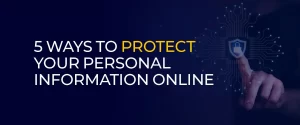

Get 93% OFF on Lifetime
Exclusive Deal
Don’t miss out this deal, it comes with Password Manager FREE of cost.
Get 93% off on FastestVPN and avail PassHulk Password Manager FREE
Get This Deal Now!By Christine Margret No Comments 3 minutes
These days, nearly all our online activities involve companies collecting personal information about us. This data is gathered and frequently used for various purposes, such as when you use social media accounts, shop online, redeem digital coupons in stores, or browse the internet.

Sometimes, one company collects your information and then shares or sells it to another. While data collection can benefit both you and businesses by connecting with friends, providing directions, or offering sales promotions, it can also be used intrusively if you don’t take control. There are many ways to protect your personal data and manage how it is shared and used.
Public Wi-Fi offers convenience but does not safeguard personal data. When using public Wi-Fi, avoid accessing critical accounts, like your banking app, or sending sensitive messages. Hackers can easily eavesdrop on these networks and capture your information or passwords. To enhance security and browse anonymously on public Wi-Fi, consider using a VPN.
Cookies can hold your login details and credit card numbers. Hackers can steal this information by taking over your browser sessions and capturing your cookies as they move online. To protect your information, you should regularly delete your cookies.
You can do this by browsing your browser’s history and clearing the data from each session, including the cookies. Alternatively, you could use subscription-based data broker removal services like DeleteMe to remove your personal information from data broker websites that collect and sell your information.
Two-factor authentication (2FA) ensures the security of each login attempt by preventing access from individuals who might have stolen an account password. Every time a login is required, it sends the account owner a secondary verification method, like a text message or email with a unique, one-time code. Enter the correct username, password, and one-time code to access the account. Always enable 2FA when it’s available to safeguard against hacking.
Reflect on all the online accounts you’ve created over the years. Now, consider which accounts remain open but are no longer in use. If one of these accounts is breached, hackers could access any associated personal information.
For instance, an old email account might store past bank statements and healthcare forms containing sensitive data that could lead to identity theft. Dedicate some time to identifying and closing unused online accounts. The less personal information you have stored online, the safer you will be.
Another way to safeguard your online data is by configuring your browser to enable cookies solely when a website requires them. Cookies are pieces of information that websites store on your computer, tracking your visits and activities. While most websites keep this data private, some might misuse it. Allow cookies but restrict them to only those websites that actually need them.
Your online behavior can reveal a great deal about you, so protect your internet security. Hackers can gather information through malvertising or other hidden methods to target you with deceptive tactics. Cybercriminals constantly seek out vulnerabilities, making it vital to evaluate your online habits promptly for more secure browsing.
Take Control of Your Privacy Today! Unblock websites, access streaming platforms, and bypass ISP monitoring.
Get FastestVPN
© Copyright 2024 Fastest VPN - All Rights Reserved.


Don’t miss out this deal, it comes with Password Manager FREE of cost.
This website uses cookies so that we can provide you with the best user experience possible. Cookie information is stored in your browser and performs functions such as recognising you when you return to our website and helping our team to understand which sections of the website you find most interesting and useful.
Strictly Necessary Cookie should be enabled at all times so that we can save your preferences for cookie settings.
If you disable this cookie, we will not be able to save your preferences. This means that every time you visit this website you will need to enable or disable cookies again.


